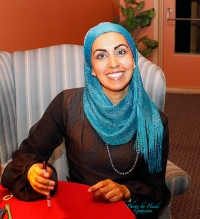
Nawaz discussed her life from her parents’ wishes for her to be a doctor, to her various films and book. (Courtesy of Flickr)
By Theresa Schliep
Zarqa Nawaz opened her discussion about faith and humor with jokes about the Jesuit cemetery at Georgetown, where she said she asked in jest to be buried but was denied because the cemetery is reserved only for Jesuit priests.
“I thought it would be cool to have an interfaith gathering under the ground,” said Nawaz.
This Monday, Canadian Muslim Nawaz presented a discussion called “Laughing All the Way to the Mosque: Finding Holiness in Humor.” Sponsored by the Curran Center for American Catholic Studies and supported by the Office of Campus Ministries, Nawaz spoke about her career as a journalist, filmmaker, television creator and author, as well as her experiences as a Muslim Canadian. She has detailed those experiences in her book, Laughing All the Way to the Mosque.
Nawaz created the world’s first sitcom about a Muslim community in the west, called “Little Mosque on the Prairie.” In it, a Muslim community gathers and worships in the basement of an Anglican church.
She also created short films, such as “Barbecue Muslims.” Narwaz created this film after the Oklahoma City Bombings, when newspapers listed Muslims as suspects until investigators nailed Timothy McVeigh, a white supremacist, as the perpetrator.
The comedy details the story of two Muslim brothers whose barbecue spontaneously explodes. While the investigators initially believes it to be them, they discover it is actually environmentalists trying to mitigate carbon emissions from barbecues.
Nawaz’s family is originally from Pakistan, but she was born in Liverpool, England, and eventually moved to Canada. Nawaz said turmoil in Pakistan and India was tragic for her father, as he was the eldest son and was responsible for caring for his siblings. Nawaz attributes her father’s unwavering belief in education to this experience.
“He thought if a woman had education and could get a real job and a lot of money, she would not need to get married,” she said of her father. “He was a very conservative Muslim man, but he was spewing stuff off like Gloria Steinem.”
She said her parents encouraged her from birth to be a doctor. However, she found mathematics and science troubling and often times answered her physics questions with essays.
“‘You can’t answer these mathematical questions with essay,’ the professors would say,” she said.
Her other films, including “Death Threat,” “Random Check” and “Friend’s Burqa” touch upon Muslim stereotypes in a humorous manner.
Nawaz eventually created a more serious film titled “Me and the Mosque.” The film details the story of a mosque in Canada in which an Imam separates men and women during prayer, a practice unfamiliar and un-Islamic to Nawaz. Then, she solicites the opinions of Muslim scholars.
Throughout the discussion, Nawaz included anecdotes about her mother, whom she said “was waiting in the wings for a long time and had a plan B,” to her medical school dreams. When Nawaz was denied from medical school, her mother gathered suitors to plan a marriage for Nawaz.
She said her mother gave her advice on how to interact with men.
“‘Ask him where he gets his prayer rugs from,’” said Nawaz, quoting her mother. “This is coming from the woman who doesn’t know how to get men — she was handed one on a silver platter!”
When Nawaz expressed disinterest in marriage, her mother was shocked.
“I said ‘I need to find myself,’” she said “What’s wrong with you, you’re standing right there.”
Nawaz found herself in journalism school at Ontario College of Art and Design, where she eventually enrolled in a summer film course.
Towards the end of the discussion, Nawaz discussed Muslim stereotypes and interactions between the West and the Muslim world. She said there are parallels between western policy in the Middle East and colonialism in North America.
“We want to civilize you because you’re barbaric, uncultured people,” she said, citing both western intervention in the Middle East and the colonists’ subjugation of First Nation Communities in Canada.
Nawaz also touched upon the current election.
“‘What makes American great?” she asked, referencing Republican presidential nominee Donald Trump’s campaign slogan. “Its diversity and its acceptance.”
She also said that the most patriotic people tend to be immigrants.
“The human experience is universal — at our core we are all the same,” she said.
Students who attended found the implications of the talk most relatable.
“It was very enlightening, the depth she brought,” said Christian Reese, FCRH ’20. “Everybody’s thinking about the election and Donald Trump, but she gave her opinions and her life story, which I thought was better than what I was expecting in that she made it seem more real and applicable.”
Angela O’Donnell, English professor and associate director of the Curran Center for American Catholic Studies, said Nawaz gave audience members an idea of the work and persistence it takes for an artist to deliver their work.
“This gave us all a sense of the inevitable sacrifices artists make for their art and also reminded us that art serves the greater good and at times the artist has to set aside her own comfort and well-being for the sake of others,” said O’Donnell.
